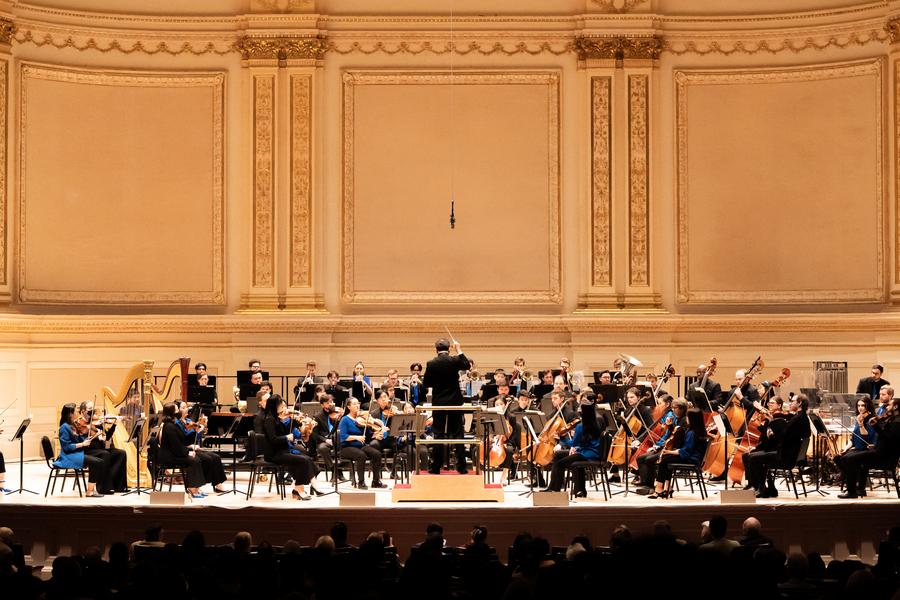
 0 Comment(s)
0 Comment(s) Print
Print E-mail Xinhua, October 21, 2024
E-mail Xinhua, October 21, 2024

Conductor Cai Jindong leads the orchestra at the opening concert of the 7th China Now Music Festival at Carnegie Hall in New York, the United States, Oct. 12, 2024. (Photo by Zack Zhang/Xinhua)
The 7th China Now Music Festival themed "Composing the Future" came to a close Saturday evening in New York City with a concert that fused East-West musical traditions and blended human-made music with artificial intelligence (AI).
The event, held at Carnegie Hall's Zankel Hall, featured two distinct parts. The first half featured musicians from the Bard East-West Ensemble, performing new works by composers from China's Central Conservatory of Music (CCOM).
With the rich sounds of traditional Chinese instruments like the pipa and guzheng accompanying Western orchestral instruments, the performance created a unique cultural and musical fusion that resonated with the audience.
The second half showcased AI's Variation: Opera of the Future, a science fiction chamber opera penned by CCOM professor Hao Weiya.
Performed by Chinese soprano Shi Lin, baritone Hong Zhenxiang, and American soprano Lucy Fitz Gibbon, who stunned the audience with her fluent Mandarin, this thought-provoking piece delved into the ethical implications of AI technology merging with human creativity.
The work, part of Hao's Chinese New Opera series, imagines a world where artificial intelligence surpasses human abilities, prompting the existential question: "Who will 'we' be when AI replaces us?"
"We listen to a lot of Beethoven and Mozart, but in the 21st century, we need more young people to pay attention to contemporary music -- the music of today," said Cai Jindong, the festival's artistic director and conductor, in an interview with Xinhua after the concert.
Reflecting on the festival's journey, Cai expressed pride in fostering collaboration between Chinese and American musicians. He emphasized musical exchanges offer a way to bridge divides.
"Cultural exchange helps us understand each other better," Cai said.
American cellist Christine Walevska, a long-time participant in the China Now Music Festival, praised Cai's approach. "Music is a language everyone understands. This is my seventh time here, and I always love Maestro Cai's interpretations, especially how he blends traditional Chinese elements with contemporary music," Walevska told Xinhua.
Dr. Wenyi Xiong, adjunct faculty in Piano Performance at New York University, was equally impressed.
"The orchestration was unique -- it's rare to see a symphony orchestra incorporate guitar alongside the guzheng. It beautifully captured the charm of both Chinese and Western music," she said.
The China Now Music Festival was co-founded in 2017 by the U.S.-China Music Institute of the Bard College Conservatory of Music, in collaboration with the CCOM.
Now in its seventh year, the festival has drawn over 10,000 live attendees and attracted nearly 100,000 online viewers in past seasons.
The Bard East-West Ensemble, part of the U.S.-China Music Institute at Bard College, has also become a symbol of cross-cultural musical dialogue. The group combines traditional Chinese instruments like the pipa and guzheng with Western orchestral instruments.